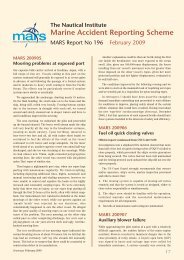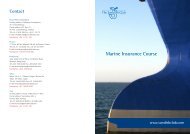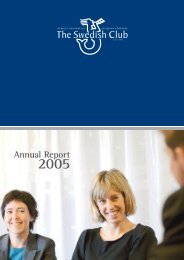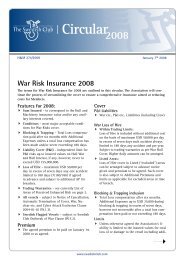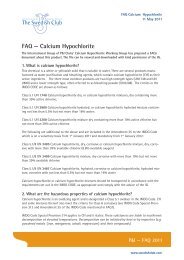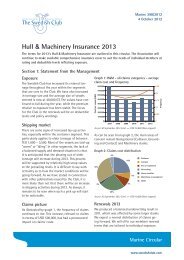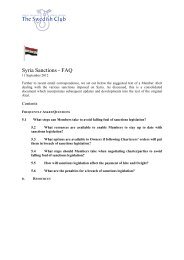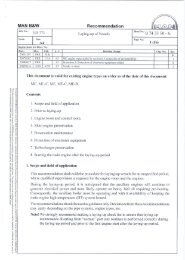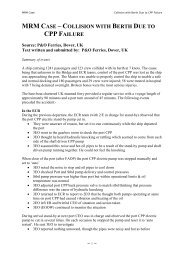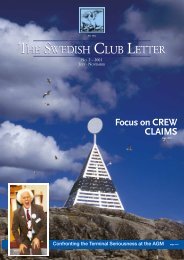List of Correspondents 2013 - The Swedish Club
List of Correspondents 2013 - The Swedish Club
List of Correspondents 2013 - The Swedish Club
Create successful ePaper yourself
Turn your PDF publications into a flip-book with our unique Google optimized e-Paper software.
Advice to Masters concerning Security<br />
Security measures<br />
As a result <strong>of</strong> actual and threatened terrorist activities there has been a rapid introduction <strong>of</strong><br />
international and national legislation aimed at increasing the security <strong>of</strong> countries and ports<br />
through stringent and detailed checks and reporting <strong>of</strong> ships and cargoes carried. This is regulated<br />
by the International Ship and Port Facility Security code (ISPS), which defines the responsibilities<br />
<strong>of</strong> the vessel’s Ship Security Officer (SSO), the Company Security Officer (CSO) and the port<br />
facility. This is all defined in the Ship Security Plan (SSP), which contains information available for<br />
inspection by PSC inspectors but also contains sections that are confidential. It is very important<br />
that the Master knows which sections are open to inspection and which are to remain<br />
confidential.<br />
This code and its USA equivalent, the Maritime Transportation Security Act <strong>of</strong> 2002 (MTSA), are<br />
intended to ensure adequate security measures are in place in order to deter terrorist activities or<br />
any other security threat against the vessel or port.<br />
<strong>The</strong> CSO will, amongst other things, ensure that the SSO performs his duties properly and is<br />
supplied with sufficient information so to do. However, the Master still has overall responsibility<br />
for running the ship and ensuring that there are no infringements <strong>of</strong> these regulations, which<br />
may lead to delay, or seizure <strong>of</strong> the vessel.<br />
For full information on the regulations, we recommend you to visit the following web sites:<br />
www.imo.org for ISPS and www.uscg.mil/hq/g-m/mp/mtsa.sht - for ISPS and MTSA.<br />
Piracy<br />
Piracy is a huge problem for the maritime industry today. It is very important that the shipping<br />
company and the vessel have identified this problem, and have a plan to deal with this risk. <strong>The</strong><br />
International Group <strong>of</strong> P&I <strong>Club</strong>s has written a booklet about piracy around Somalia, and has<br />
suggested planning and operational practices for the vessel and manager to deal with this issue.<br />
<strong>The</strong> booklet can be found on <strong>The</strong> <strong>Swedish</strong> <strong>Club</strong> website, and is called “BMP4 - Best Management<br />
Practices for Protection against Somalia Based Piracy”.<br />
<strong>The</strong> 24-hour rules<br />
Also recently introduced are what are referred to as "the 24-hour rules" which provide for full<br />
details <strong>of</strong> cargo to be loaded to be notified, in most cases 24 hours before loading – failure to<br />
comply with these rules could lead to the ship being delayed or detained and in extreme cases<br />
your own detention.<br />
A clear explanation <strong>of</strong> these rules can be obtained from <strong>The</strong> <strong>Swedish</strong> <strong>Club</strong> website under<br />
News/Circulars, P&I Circular No P&I 2427/2004 dated 20 February 2004.<br />
<strong>The</strong> <strong>Swedish</strong> <strong>Club</strong> | 178



